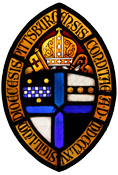Tuesday after Pentecost
June 2, 2020
Dear friends in Christ,

On the day of Pentecost, a preacher named Simon Peter gave a sermon to a crowd of his own people in which he blamed them specifically for the murder of an innocent man named Jesus. Some of them were no doubt insulted by the accusation that they were responsible, when they had been nowhere near Gethsemane on Thursday or Calvary on Friday. That didn’t matter, said Peter. You are a part of what happened. You didn’t claim Him. You didn’t defend Him. You pretended it wasn’t your responsibility. And now he’s dead, this Jesus, whom you crucified. (Acts 2:36).
And the response of Peter’s audience was surely the work of the Holy Spirit. No one said, “Well, what about Pilate? What about Caiaphas?” No one said, “He had it coming. He broke the law!” Instead, to a person, they were cut to the heart. They saw that they were a part of it, whether they had been there or not. And they asked the great question of every convicted heart, “What shall we do?” (Acts 2:37)
When I saw the video of George Floyd being slowly killed by a white police officer in Minneapolis, I was cut to the heart. I was sickened and grieved, but another part of me wanted to push it all away. How was this my fault? If the police had anti-racism training this might not have happened.
But when you’re cut to the heart, under the power of the Spirit of God, you can’t escape the truth. I was a part of what happened. I still am.
I know we have all seen such terrible moments before, heard the cries, “I can’t breathe” or “Don’t shoot.” People have raged and grieved and protested, and eventually the world has calmed down and gone on, until the next terrible moment, and the next cycle of rage and grief.
But this is different: now it seems as though the whole reservoir of anger, fear and despair that lies underneath the collective life of African Americans has finally been untapped, is boiling over. And along with this flood of grief it seems there is coming a flood of conviction, of recognition by a lot of white people that we were a part of this, are a part of this.
This time, perhaps, those of us who are white have finally been cut to the heart by what we heard and saw in that video, in a way that might change the way we look at the world and how we act in it, how we understand the good news of Jesus, how we repent, and how we move forward in hope of healing and reconciliation with our black brothers and sisters.
I want to outline four particular steps I personally will be taking within the diocese.
First, I want to assure my black sisters and brothers that I do see you and hear you. I know it’s not enough just to say this. I know that I – all of us – need to find clear ways to demonstrate that we see you, hear you and love you. I don’t mean by setting up a commission or a task force or by some other way of brushing stuff under the rug while looking like we are hearing; but actually hearing and showing that we are hearing. And honestly, right now, I do not know what that will look like. But I know God knows, and I will trust Him to show me. So, please, continue to talk to me. Let me hear from you by email at dmcconnell@episcopalpgh.org
Second, I will call together an informal council of advice, of black leaders lay and ordained, to look at the impact of racism within this diocese: Who is not at the table, what inequalities exist and how they can be resolved, where the barriers are and how they can be removed. I do not know yet who they will be, or how many, but I know at least half of them need to be young (I don’t just mean younger than me – I mean young).
Third, I need to hear from other white people who are cut to the heart by the death of George Floyd, as I am. I know this is a jarring request. However, I agree with black friends who have been very clear that it is not the job of black people to tell white people what we need to do to stop endangering their lives. It is our responsibility to figure that out. For whatever reason, anti-racism training as offered in this diocese is not enough. We need a variety of approaches and solutions. If you wish to help, please reach out to me.
Fourth, I call us all to an ongoing movement of repentance and reconciliation, beginning with an open-invitation regular Zoom gathering with me for prayer and restoration, followed by time to talk. If you have any advice to share with me regarding the design and timing of that service, again, send me an email.
This all may seem like a small offering, given the gravity of what has happened and continues to happen. I suppose it is small, but we have to start here, and start now.
When the crowd who heard Peter were “cut to the heart” and asked him, “What shall we do?”, his response began with one word: Repent. But then he continued, speaking of the gift of the Holy Spirit, the promise that is “for you, your children and for all who are far off, everyone whom the Lord our God calls to himself.” (Acts 2:38-39.) Friends, this is the gift we have received; the promise is now ours. Let us please trust that God will use our broken hearts to reveal His glory and show us the way out of racism and its consequences, for us, for our children, and for all who are far off.
Faithfully your bishop,

(The Right Reverend) Dorsey W.M. McConnell, D.D.
VIII Bishop of Pittsburgh
Click here for a printable version of the bishop’s letter (PDF)
